The United Nations Security Council has sanctioned five individuals from Libya, Tunisia, Kuwait, and Tajikistan for financing, recruiting, and providing operational support to ISIS and al-Qaeda. In a statement issued on August 22, the Security Council’s sanctions committee confirmed the addition of the five individuals to its international terrorism blacklist. The designations carry a global asset freeze, travel ban, and arms embargo under UN counterterrorism measures.
Those named include Libyan national Ibrahim Ali Abu Bakr Tantoush, Tunisian citizen Al-Azhar bin Khalifa Rouin, Kuwaiti nationals Suleiman Jassim Ali Abu Ghaith and Shafi Sultan al-Ajmi, and Gulmurod Khalimov, a former Tajik police commander who later rose to the position of a senior ISIS military leader.
Investigators said the individuals had maintained longstanding ties with extremist groups, facilitating networks across Afghanistan, Syria, and Libya to move funds, weapons, and foreign fighters. Some had previously been jailed in Europe and the United States on terrorism charges, while others remain fugitives and are wanted by Interpol.
Counterterrorism experts said the sanctions mark a significant step in disrupting extremist financing networks. By restricting access to the international banking system, targeted sanctions aim to sever critical funding channels used for recruitment and operational planning.
The UN report stressed that these designations highlight the persistent challenge of dismantling resilient transnational terrorist networks that continue to operate across multiple conflict zones.
The Security Council frequently updates its sanctions list based on intelligence from member states and international agencies. Officials said the latest measures form part of broader global efforts to weaken terrorist organizations by isolating their leadership and undermining their financial base.
Analysts noted that while sanctions cannot replace counterterrorism operations on the ground, they remain an essential instrument of international pressure against individuals and states that provide support to extremist groups. The new listings underscore the UN’s commitment to denying safe havens and resources to global terrorists.





